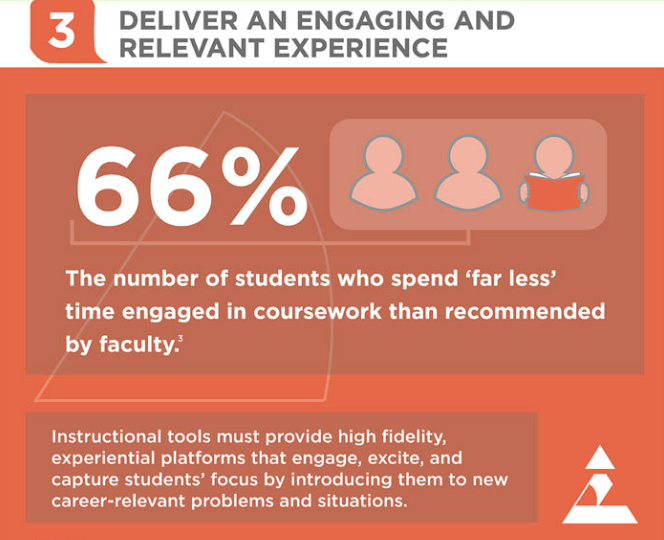Four Criteria to Promote Meaningful Development: Deliver an Engaging and Relevant Experience
September 4, 2018
A new generation of students, one that struggles to focus in the classroom, requires instructors to implement new solutions that better meet their developmental needs. Unfortunately, the popular tools used across education often fail to meet the third criteria needed to promote meaningful student development – delivering an engaging and relevant experience.
If you would like to revisit the four criteria needed to promote meaningful development before we discuss the importance of delivering an engaging and relevant experience, click here to view our recent infographic.
Deliver an Engaging and Relevant Experience
The decline in student engagement, the time and energy students devote to educational activities inside and outside of the classroom, can be partly attributed to the instructional tools being implemented across the education industry.
Research conducted by Gallup Education reveals that student engagement drops from 75% in grade 5 to 34% in grade 12. As a new tech-oriented generation of students enters the classroom, educators have failed to adapt to meet their developmental and instructional needs.
Traditional instructional tools generally provide heavy doses of lectures, reading, and note-taking, all of which disengage students characterized by a shortened attention span. Instructional tools must provide high fidelity, experiential platforms that engage and capture students’ focus.
These tools introduce students to new areas outside of their comfort zone and encourage real-world perspective. For example, consulting projects allow students to experience career-relevant situations and problems in an environment that mirrors the professional world and their future role within an organization.
Likewise, a simulation that makes students responsible for business decisions across an entire organization promotes cross-functional collaboration and career-relevant decision making. An experiential learning platform, such as a simulation, engages students and bridges the knowing-doing gap by allowing them to test assumptions and learn from mistakes in a controlled environment.
As students obtain a clear picture of the connection between the development process and their future success, they become more involved and take ownership of their education. “The more actively engaged students are…the more likely they are to learn, to stick with their studies, and to attain their academic goals.” – Kay McClenney, C. Nathan Marti, Courtney Adkins, CCSSE
Discover the Solutions that Fit Your Needs
Discover how our suite of experiential learning solutions deliver an engaging and relevant experience to promote meaningful development by contacting us at welcome@capsim.com or fill out the form below to see what challenges we can help you solve.



.png?width=80&name=1-questions%20(1).png)